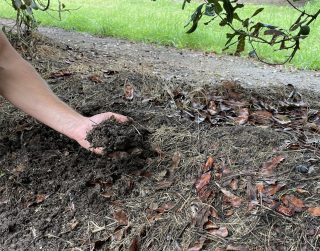Contact media team.
If you're a journalist looking to reach our global media relations team, please contact us.
Get in touchThought leadership

Today, as the world marks World Soil Day, at Climate Asset Management we acknowledge that the rise of civilization and the world’s continued ability to sustain food production have always been heavily dependent on soil.
Of the many services soil provides humanity, one that is often overlooked, is soil’s ability to remove and store carbon. It might surprise you to know that the volume of carbon stored in soil around the globe is estimated at 2,500 gigatons. Just to put that into context, that is approximately three times as much carbon as is in the atmosphere and four times the amount in every living thing on earth combined (Nature, 2012).
However, cultivated soils have lost 50-70% of their soil carbon stock through conversion and management practices (Lal, 2004). On croplands, which, at five billion hectares make up ~38% of the global land surface, management practices including tilling and leaving the soil bare result in ongoing losses of soil organic carbon (SOC) that pose challenges for climate change as well as soil productivity. Actively managing agricultural land to store more carbon can significantly improve soil health and food production.
In the world of natural climate solutions, there is an understandable focus on trees and forests for the carbon they are able to store both above- and below-ground in their trunks and roots. In addition, the focus is swinging to agricultural land management changes that will promote enhanced SOC removal and storage. Perennial tree crops – these are orchards of trees producing nuts or fruit – can be overlooked due to their relatively small footprint. However, these orchards are able to combine both approaches into one, offering carbon removal in tree biomass and soil.
Perennial tree crops can survive for decades; store carbon in their trunks and limbs; and grow deep roots that help soil store more carbon. Active management of orchards using regenerative agricultural practices including cover-cropping adding organic amendments can deliver meaningful soil carbon removal outcomes as well as improvements in long-term productivity.
Perennial tree crops are the main focus of our Natural Capital Strategy’s agricultural approach. To assess the potential climate impact of our recent investment in a 1,500 Ha greenfield macadamia orchard in Queensland, Australia, we have teamed up with consultants TerraCarbon and Carbon Friendly to characterise the pre-investment state of the soil, which has been badly degraded through years of intensive sugarcane cultivation, and the expected carbon storage in trees and soil post-establishment.

We have found that the asset has the potential to remove and store up to 80,000 tCO2e over 10 years, split roughly half and half between soil and tree biomass. Measured results from reference orchards managed by our operating partner, Macadamia Farm Management, indicate a similar outcome.
There is not a great deal of scientific literature specific to carbon removal by perennial tree crops, and through this project, we hope to partner with scientists and researchers to contribute new learnings to the global conversation about natural climate solutions, and the role perennial tree crops can play.